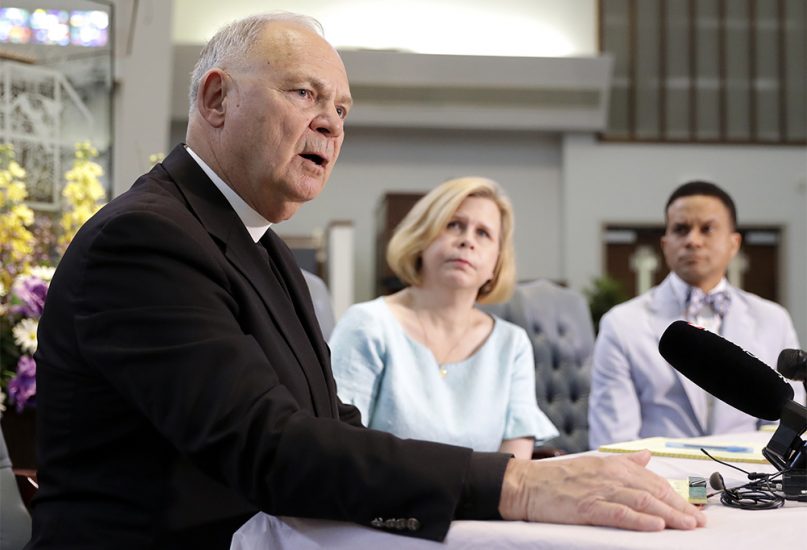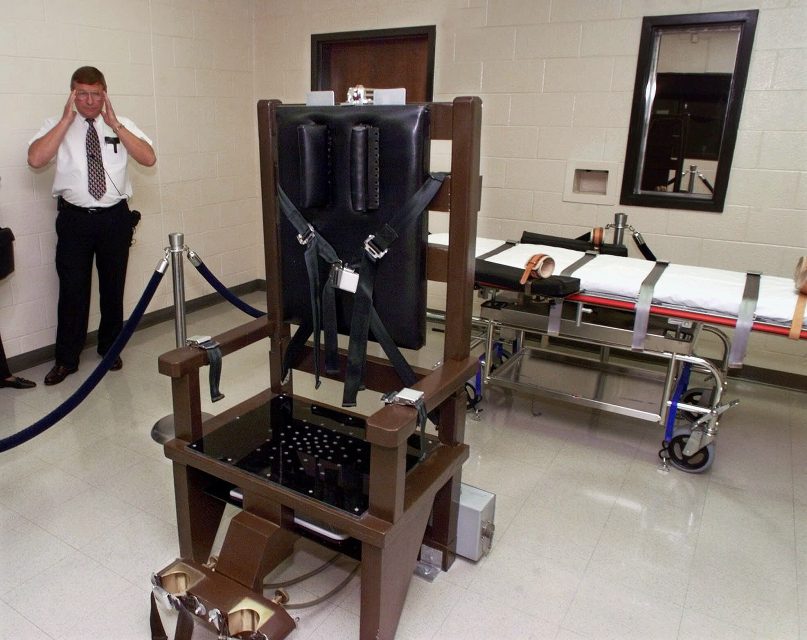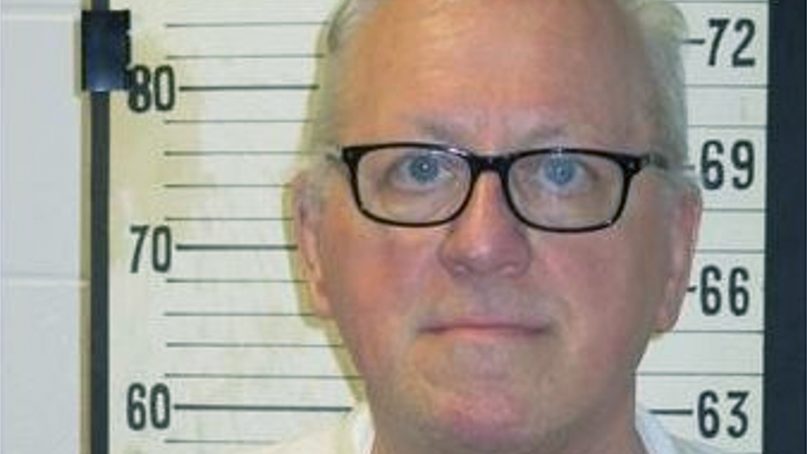(RNS) — It’s the first time I’ve counted down the days to a friend’s execution. Unless there is a miracle from God or compassion from the state’s governor, Tennessee will kill Don Johnson by lethal injection on May 16.
I have a model of a lighthouse in my office that Don made for me, a sign of the friendship we’ve built in my visits over the past five years to Unit 2 at Riverbend Correctional Facility, Tennessee’s death row.
Over the years we’ve laughed together. We’ve prayed together. Told each other jokes. We’ve sung songs like “Amazing Grace” and he’s taught me the true meaning of the words, “How sweet the sound that saved a wretch like me.”
Don had one of the most horrific childhoods of anyone I’ve ever met. He was abused, bullied, abandoned, institutionalized. The abuse he endured, he transmitted, culminating in the death of his wife. Unlike many on death row who I believe are innocent of the crimes for which they face execution, Don’s guilt was never in question for me. But neither was his redemption.
What’s most remarkable about Don is not what he did that landed him on death row; it’s what God has done with him since. His story is a grace story, a redemption story. It’s a Jesus story.
That story began in the Shelby County, Tenn., jail, while Don was awaiting trial. He heard another inmate talking about the healing power of Jesus. As Don was convicted and taken to death row, he heard more redemption stories. Soon he dedicated his life to Jesus. He was baptized on death row.

Pastor Charles Fels, left, who is also an attorney, speaks on behalf of death row inmate Don Johnson in Nashville, Tenn., on April 3, 2019. Supporters of Johnson are appealing to Gov. Bill Lee’s Christian faith in requesting clemency for Johnson, who they say was redeemed by Jesus. At center is Kelley Henry, an assistant federal public defender, and at right is Pastor Furman Fordham. (AP Photo/Mark Humphrey)
Years later, he is an ordained elder of his church. Of his 25 million-member denomination, he’s the only elder on death row. Riverbend’s Unit 2 is his parish, and many inside the prison and out can testify of how his faith has shaped them, including correctional officers and staff.
But the most stunning, and credible, witness of all is his daughter, Cynthia Vaughn.
After losing her mom at the age of 7, she became a champion for the death penalty, especially when it came to the execution of her dad. She wanted him dead. She hated him. The death penalty seemed like justice, at first.
Cynthia eventually found that her hatred was not hurting him, but it was killing her. She found herself in a prison of her own anger and resentment, confined, in her words, “to my own internal house of hell.” The justice she sought turned out to be revenge.
I first met Cynthia when we both spoke at an event in Nashville. It was the first time she would talk about her change of heart, how she found a way out of her internal hell. I had recently released a book titled “Executing Grace,” on the death penalty, restorative justice and the power of forgiveness. Cynthia had come to embody everything I wrote about – the power of grace to heal the wounds of both the offended and the offenders.
I got into Nashville early that day so I could visit Don. I hesitated to tell him about the event because I wasn’t sure about the dynamics of their new relationship. All I knew was that after 30 years of not speaking, they were working hard to heal the wounds of their shared past. I didn’t want to further complicate any of that.
I simply told Don I was in town for an event that night. I could see in his eyes and his proud, ear-to-ear smile that he already knew. He said, “You’ll be with my daughter,” and went on to tell me all about what a bright light in the world she is, what a gift it is to have her in his life again.
That evening, I heard Cynthia tell of being set free from the prison of her own hatred, about the power of forgiveness to heal both the victims and the victimizers. She talked about being able to giggle again, and being able to hear birds sing after so many years in a solitary confinement of its own sort.
She forgave her dad, not so he could sleep at night but so that she could sleep at night. Now she is fighting to save his life.
Cynthia is fighting for alternatives to the death penalty – for her dad, and for everyone else. Despite its promises of closure and justice, the death penalty extends trauma, exacerbates wounds and creates a whole new set of victims, something Cynthia knows all too well.

In this Oct. 13, 1999, file photo, Ricky Bell, left, then the warden at Riverbend Correctional Facility in Nashville, Tenn., gives a tour of the prison’s execution chamber. (AP Photo/Mark Humphrey, File)
The electric chair used in two of Tennessee’s three executions last year is a mirror of the evil it promises to heal. The “cure” is as bad as the disease.
Violence is the problem, not the solution.
Despite the voices of folks like Mother Teresa, Pope Francis and so many others, the death penalty has survived in America largely because of the support of Christians. Nearly 90% of all executions in the past 40 years have occurred in the Bible Belt. As one death row chaplain says, “The Bible Belt is the death belt in America.”
Grace is at the heart of the Christian faith – this belief that God gave us grace when we didn’t deserve it. The United Methodist Church’s 50-year-old statement puts it well: “We believe the death penalty denies the power of Christ to redeem, restore and transform all human beings.”
We undermine the redemptive work of Jesus on the cross and rob our fellow sinners of the possibilities of redemption every time we take the life of a child of God by state execution.
When we kill those who kill to show that killing is wrong, we legitimize the very evil we hope to rid the world of, the evil that sent Jesus to the cross.
The Bible is filled with murderers who were given a second chance, including Moses, David and Saul of Tarsus. The Bible would be much shorter without grace.
Martin Luther King Jr. called execution “society’s final assertion that we will not forgive.” In 2017, Pope Francis declared that the death penalty is “contrary to the gospel.”
Many Americans, including many young evangelical Christians, see the disconnect between following Jesus and our capital punishment. In a nationwide survey, only 5% of Americans said that Jesus would support the death penalty.
After all, Jesus said, “Blessed are the merciful, for they will be shown mercy.” In the Gospels, Jesus interrupted an execution of a woman guilty of a capital crime, saying, “Let the one who is without sin, cast the first stone.”
No one is above reproach. And no one is beyond redemption.
This week grace has a chance to be amazing in Tennessee. We just need Christians, and Christian lawmakers in particular, to ask the question: What would Jesus do? And then do it.
With just a few months in office, Gov. Bill Lee is facing his first death penalty decision. He needs all of our prayers.
It is my prayer that the leaders of my home state will declare that execution is not the best version of justice we can come up with.
I pray Lee will celebrate the power of God to redeem a broken sinner like Don – like Moses, like David, like Saul, like me. I also pray he will be moved by the power of mercy and forgiveness embodied so beautifully by Cynthia. And I pray that he will honor the wounds they are actively working to heal … by not creating more wounds.
(Shane Claiborne is the author of “Executing Grace: How the Death Penalty Killed Jesus and Why It’s Killing Us.” The views expressed in this commentary do not necessarily represent those of Religion News Service.)





